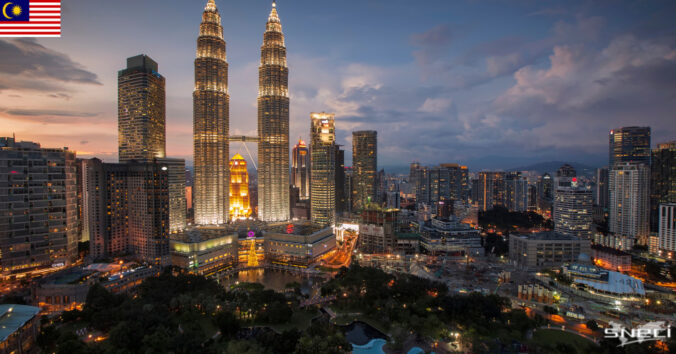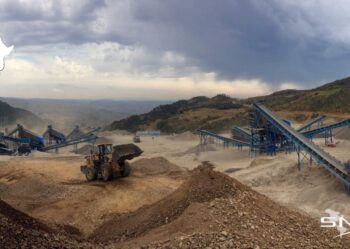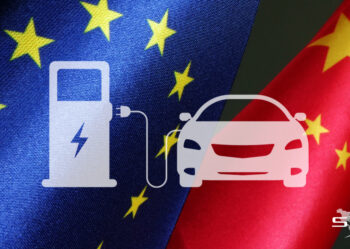Malaysia: an opportunity for many sectors.

Malaysia, one of the countries in the ASEAN zone, represents today a country of opportunities with many promising sectors, notably in aeronautics, rail and urban transport, defense and security, energy, IOT industry, “Techs”, health…
Malaysia attracts many companies for various reasons, besides the fact that it represents a hub located in the heart of the Indo-Pacific Ocean, it has modern infrastructures and well maintained public finances, political stability, a development model open to foreign direct investments, a well-controlled macroeconomic policy, competitive labor costs and a high level of education allowing a qualified and English-speaking competitive workforce.
In this respect, Malaysia represents a real asset in the international competition alongside its neighbors such as Singapore, Indonesia and Thailand.
Let’s discover together, Malaysia, the new Eldorado which is teeming with business opportunities and which, moreover, has set up an ICP system (a Malaysian compensation program) aiming to ask foreign industrialists to propose programs favoring the economic and/or industrial development of Malaysia.
The Malaysian economy:
With an annual GDP growth of +6.1% on average for nearly 50 years compared to +6.8% annual variation in 2021 for France, Malaysia has one of the most mature and diversified emerging economies in the region.
As the world’s 37th largest economy, Malaysia ranks among the best emerging countries in terms of business climate (12th in the 2020 Doing Business ranking) and was France’s 4th largest trading partner in Southeast Asia in 2019.
With many promising or changing sectors that have driven growth over the past 30 years, such as defense, automotive and oil, Malaysia has been able to diversify its economy thanks to its good integration into global value chains, allowing the emergence of new sectors such as aeronautics, electronics, services and digital technology.
It is one of the most economically open countries in the world with foreign trade representing 130% of its GDP in recent years.
Malaysia has a large middle class and a level of wealth that ranks 2nd in ASEAN (excluding Brunei). Its GDP is behind Singapore but ahead of Vietnam, Indonesia and Thailand.
With a population of 32.6 million, Malaysia also benefits from a strong cultural diversity, characterized by three main ethnic groups:
- The Malays,
- Chinese and
- Indians,
- Other minorities.
Today, there are 300 subsidiaries of French companies established locally (including SNECI), to which must be added 150 French entrepreneurs who have created their company there, employing more than 30,000 employees. This is a new Eldorado for French industrialists as well as SMEs and ETIs.
The various growth sectors in the ASEAN zone :
Aeronautics:
The Malaysian government has set up its 2nd governmental plan for the aerospace industry (2015 – 2030) whose ambition is to raise the Malaysian aerospace industry to the 1st rank in South-East Asia and to make the country a major world player. This new roadmap (Malaysia Aerospace Industry Blueprint 2030), is based on an aeronautical activity of approximately 12 billion USD per year and the creation of 32,000 high value-added jobs by 2030 as well as :
- Strengthening of the airport hub at Kuala Lumpur airport through the development of KLIA Aeropolis, a multimodal hub (airport, aviation and logistics) covering 100 km².
- The growth of the fleet operated from Malaysia has driven the growth of the infrastructure and associated services.
- Aeronautics has many advantages:
- The search for foreign expertise.
- The government’s desire to position the country as an MRO hub while developing local engineering and production.
- State aid to companies (tax exemptions, subsidies, etc.).
- Technical and vocational training needs.
Rail and urban transport :
Malaysia has one of the highest infrastructure investment expenditures as a proportion of GDP in ASEAN (projected cumulative infrastructure investment: EUR 352bn between 2016 and 2040), with a major program to build new metro lines in major cities, as well as to expand and upgrade existing urban transport systems in Greater Kuala Lumpur including:
For heavy metros: The most important project underway is the creation of an integrated urban heavy metro system, called MRT (Mass Rapid Transit) with over 100 stations planned over a distance of 156 km, 40 of which are underground as well as 2 radial north-south lines and a circular line with a 20 km radius around Kuala Lumpur, with each line integrated into Kuala Lumpur’s existing rail systems.
- The 1st MRT 1 line (51 km; EUR 4.8 billion), which started construction in July 2011, was completed in 2017. The high value-added lots were awarded to Siemens (rolling stock), Bombardier (safety/signaling) and Meidensha Corp. of Japan (electrification). The ticketing package was awarded to ACS France. The French company Bachy Solétanche (Vinci Group) was involved as a subcontractor for certain complex works (foundations).
- The 2nd MRT line (52.2 km, including 13.5 km underground between Sungai Buloh, Serdang and Putrajaya – 37 stations, 11 of which are underground; EUR 5.8 billion) was finalized and awarded to the Malaysian consortium MMC-Gamuda. The French company Bachy Solétanche (Vinci Group) is involved in certain complex works (foundations).
- The third MRT 3 circular line of 40 km (EUR 4.6 billion) is in the study phase and could be operational in 2027.
Light metros: As regards the light metro (LRT – Light Rapid Transit), the 2 existing lines have been extended
- The 1st LRT: Kelana Jaya Line: 17.4 km, 13 stations
- The 2nd LRT Ampang Line: 17.7 km, 12 stations
- The 3rd LRT: will connect Bandar Utama to Klang (37 km, 2.2 billion EUR) and is expected to enter service in 2024.
Colas Rail Asia has contributed to the extension of Kelana Jaya Line 1 (electrical work and track laying) and Thalès to the signaling.
It should be noted that the acquisition of intelligent transport system equipment to modernize the existing urban transport infrastructure is required for integrated single ticketing, improved bus route signaling, electronic arrival displays, dynamic route maps, etc.
Defense and security:
Malaysia is seeking through tenders to modernize its defense equipment, some of which is ageing (PT91 tank, Adnan armored vehicle, Sukkhoi-30 and F-18 fighter planes, Black Hawk helicopters, Lekiu frigate, etc.).
Defense and security have many assets:
- The permanent need to upgrade or improve equipment
- The need to fight against illegal immigration
- The need to combat piracy leading to increased requirements for maritime security equipment, air defense systems and border security technologies.
- Malaysia’s need for cooperation with other countries (in the field of drones, artificial intelligence, aeronautics, etc.)
Green energy:
Important information, Malaysia is the 3rd largest energy consumer in South East Asia behind Indonesia and Thailand with a 100% electricity access rate in Peninsular Malaysia. The Doing Business 2020 ranking places Malaysia 4th in the world for electricity connection.
The electricity generated from photovoltaic panels is 403 MW with the implementation of large-scale solar project (LSS2) in 2019. The country plans to generate up to 1,700 MW of electricity from solar energy by 2025. The 3rd phase of the country’s large-scale solar project (LSS3) is being implemented for an additional 500 MW of capacity.
Green energy has many advantages in Malaysia:
- Approximately 12% market share in global PV production is held by Malaysia.
- Malaysia ranks 2nd for photovoltaic modules
- Malaysia is in 3rd place for photovoltaic cells.
- Malaysia has an ecosystem of 250 companies in upstream activities and aims to achieve 1,700 MW of solar power by 2025 out of a total target of 3,900 MW of renewable energy (i.e. 20% of the expected energy mix).
Oil & Gas:
Malaysia ranks 26th in the world in oil reserves and 16th in gas reserves. In the ASEAN region, Malaysia is the second largest producer of crude oil. Malaysia is also the 4th largest exporter of LNG (liquefied natural gas) in the world.
Malaysian oil & gas has many advantages:
- A proactive hydrocarbon policy by successive governments to strengthen Malaysia’s position in the sector.
- A mature Malaysian hydrocarbon market which offers business opportunities for equipment and associated services, particularly for French companies in the sector which are well represented, even if the oil and health crisis slows down projects.
- Many international companies in the sector have chosen Malaysia as the location for their regional headquarters in order to develop strategic segments such as drilling, engineering, manufacturing and installation of offshore platforms and other maintenance operations.
Industry of the future including IOT:
Malaysian manufacturing is one of the important economic sectors that has contributed about 22% of the GDP in the last five years.
The sector is made up of 49,000 manufacturing companies, most of which are SMEs. Malaysia is thus endowed with a dense industrial fabric, whose integration into global value chains has enabled the country to diversify, such as in the aeronautics, automobile (3rd largest manufacturer in the region) or electronics sectors, and to develop export activities.
Malaysia is seeking to accelerate the digital transformation of its industry to have “smart factories”, associated with robotic solutions, intelligent sensors to collect data and predictive analysis to optimize production.
The industry of the future with IOT in particular has many advantages:
- Malaysia is a highly industrial country
- Malaysia wishes to robotize and digitalize its industry
- Malaysia wants to integrate new technological applications, encouraging Malaysian manufacturing companies to innovate and invest in new technologies to remain competitive.
- Malaysia wants to increase the productivity level of the manufacturing sector by 30%.
- Malaysia wants to increase the number of highly skilled employees and the share of the manufacturing sector in the Malaysian economy.
- Malaysia wants to be among the 30 most innovative economies in the world, based on the Global Innovation Index ranking knowing that it is currently ranked 35th.
Pharmaceuticals:
Over the period 2017-2027 in Malaysia, the compound annual growth rate of pharmaceuticals is estimated at 9% per annum.
In Malaysia, the network of parapharmacies and independent pharmacies, medical biotechnology and pharmaceuticals are growth sectors.
Local manufacturers typically produce antibiotics, generic injectables, analgesics and dietary supplements. The Malaysian pharmaceutical market is mainly based on imported drugs, as there is a strong demand for branded products. Foreign laboratories represent 62% of the pharmaceutical market, notably from the United States, Germany and France.
Pharmaceutical products have many advantages:
- Potential openings exist in the halal products sector
- Potential openings in alternative markets such as homeopathy.
- The market for food supplements, vitamins and alicaments represented more than EUR 681 million in 2019, i.e. +10% compared to 2018, and should reach more than EUR 1.1 billion by 2024.
ICP program to support companies to invest and/or set up in Malaysia:
The Malaysian government is committed to improving the country’s competitiveness in the global market by developing domestic technology and industrial sectors, in line with the national goal of achieving high-income nation status.
To support this agenda, the government is using the Industrial Collaboration Program (ICP) platform as one of its strategies to provide opportunities for local companies to participate competitively in the global supply chain and market.
The ICP has identified gaps in local industry, particularly in terms of capacity to meet and raise global standards.
The ICP is also seen as a long-term investment strategy by companies that have been awarded government contracts to develop and strengthen their businesses in Malaysia.
The Industrial Collaboration Program (ICP) is a program involving activities that add value to any procurement made with funds provided by the Government of Malaysia. The objective of these activities is to achieve maximum benefit and impact on the development of the local industries concerned, in a holistic manner, as a return on the government’s investment through the purchases made.
To support the aspiration of the KPI, the KPI provider is required to consider the impacts of the proposed program for short, medium and long-term gains. The Malaysian government has categorized KPI implementations into 3 main platforms that the KPI provider can use as a guide:
- The Economic Enhancement Program (EEP) applies to local companies that have been awarded a contract by the government for any contract equal to or greater than RM100 million in supplies, works and services.
- Counter Trade applies to foreign companies that have received a government contract worth RM50 million or more. In this category, the maximum value of PCI credit generated will be the same as the cost of the counter trade that can be implemented through the counter purchase or buyback program.
- The offset program is a program that involves activities aimed at strengthening local competitiveness by prioritizing technology development and the knowledge economy.
SNECI and support in Malaysia
With over 70 years of experience and 10 subsidiaries abroad, we support companies in their international growth through agile and local technical and commercial expertise.
As an expert in the internationalization of French and foreign companies, SNECI supports companies in their export growth through various services. Since 2019, we have our own office SNECI South East Asia based in Kuala Lumpur to be closer to our customer and to support companies internationally especially those who produce or supply themselves in ASEAN.
Our various solutions in business development and industrial performance at the international level allow us to support suppliers and manufacturers in different fields of expertise:
- In industrial performance, we provide our clients with the means to achieve operational excellence, by supporting them in their industrial projects or by training and coaching their teams. We also have in-depth expertise in assessing industrial companies and implementing best practices in quality, purchasing and logistics.
- In business development, our team partners with suppliers who are expanding into new regions or seeking to acquire new customers by acting as an extension of their sales, project, quality and logistics teams. We also advise companies on their partnership and acquisition strategy.
If you would like our team of over 70 years of experience in the automotive industry, with 450 experts worldwide, please contact Laura by email at laura@sneci.com or directly via the contact tab on our website.





